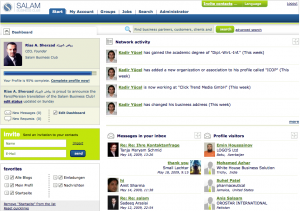Two of my uncles, my mom’s older brothers, have disappeared in the torture cells of the Afghan communists in the late 70’ies. We never found out what happened to them, they never showed up again and just vanished like they never existed. The only information we had on them were eye witnesses, that made it out of the torture cells, that told our family how they saw one of them lying in a cell, bloodied and badly tortured. That’s all we knew and from then on they were never heard of again.
The Dutch government has now obtained and released lists of some of those that were killed during the communist regime. I deliberately wrote “some of those” because in reality it wasn’t just the 4.785 victims from that list but hundreds of thousands more.
On the list my uncles show up as #202, Mohammad Yaqhub Arsala, and #4434, Abdul Samey.
Hopefully this will give my family some closure as to what has happened to them, although we always knew that we will never see them again in this life.
Now that communism is pretty much dead the only thing that is not dead are its followers. The only people that unfortunately were almost never punished are the perpetrators, living among us, boasting about how they tortured “Ikhwanis”, a derogatory term for “Ikhwan-Al-Muslimeen”, the Muslim Brotherhood, and how they were in positions of power back then. Many of them now live off of welfare in the Netherlands, Sweden, Germany and the U.S., clinging to the “good old times” under the communists, especially Dr. Mohammad Najibullah Ahmadzai, and romanticizing how he was “such a good leader”.
Yes, that Najibullah, the hero and idol of a whole generation of feeble-minded Afghans growing up in the West. Repeating the fairy tales that their mentally deficient communist parents keep telling them about how Kabul was prospering under him and how he predicted the rise of Islamic fundamentalism and how it was him predicting the destruction of Afghanistan should any of the Mujahedeen factions ever come into power. They might have missed the fact that many individuals and institutions predicted bad times for Afghanistan once the Russians were defeated, not only Najibullah. And they left out the fact that it was the communists that started the following three painful decades over Afghanistan.
To quote from a posting my cousin Khushal made:
“In January 1980 the KGB selected as head of KHAD the energetic, brutal thirty-two year-old Muhammad Najibullah, a man capable of intimidating opponents by his mere physical presence. Codenamed POTOMOK, he had probably previously been recruited as a KGB agent. Embarrassed by the reference to Allah in his surname, Najibullah asked to be known instead as ‘Comrade Najib’ […]” (408, Mitrokhin).
This is how the former high ranking KGB officer remembered of Dr. Najibullah the head of KHAD and later president, “Najibullah sometimes executed prisoners himself. His preferred method, according to survivors of his prisons, was to beat his victims to the ground, then kick them to death […]” (409, Andrew and Mitrokhin).
Afghans are easily deluded by eloquent speakers. We always were because many of us keep hanging on to the concept of our country having to be run by one powerful man and not that “complicated” concept of separation of legislative, judicial and executive powers. We’re looking for a leader from our past, someone that is remembered as a great statesman like Mirwais Khan or Khushal Khan and that simple thinking even shows in our songs.
All we need to know and always remember is that we’re our own biggest enemies. We love blaming the fault for our own shortcomings and misery on the West, the “non-believers” and neighboring countries when most of the atrocities were committed by our own people. It was Afghans that turned against Islam and became communists. It was Afghans that turned against their own beliefs and people and became murderers. It was Afghans spying on Afghans and arresting their neighbors all while believing in a delusion called communism.
Whenever we feel there’s something wrong about how things are going in our country and among us all we need to do is look in the mirror to realize that the darker side to it all lies within ourselves, parts of our culture, our illiteracy and our categorical condemnation of any renewal and anything stemming from the West. The only answer we need is to look at our actions and deeds and see how much they are compatible with Islam. Islam has an answer to every one of our questions but in a pathetic chase for modernization we’ve lost ourselves and our faith.
Nowadays Afghans love buying houses on non-Halal loans from non-Halal banks but keep complaining about how the world’s financial systems are all “controlled by Jews”. Afghans love running restaurants that sell alcohol and pork but will raise hell if their daughters decide for themselves to choose whom to marry. Afghans are driven by short-term financial gains while being married to a long-term dream of reputation and prestige. I see contradictions over contradictions in them and no clear vision.
They complain about U.S. involvement (read: help) in the Afghan-Russian war of the 80’ies but keep forgetting that it was for American stingers that prevented more atrocities committed by Russians and Afghan communists against the Afghan people. Yes, it was a proxy war and yes, the U.S. didn’t get involved for altruistic motives but for their own geopolitical strategy but explain that to the widow of an innocent soul that disappeared in an Afghan communist torture chamber.
At least we have some closure but the chapter about justice stays unwritten until all of those responsible have been punished.

 I’d be interested to find out what they have in common with Rahman Baba and what they will do about all the Afghans in Hamburg that have started stealing table mats from Double Coffee stores that have Rahman Baba’s picture printed on them? :-)
I’d be interested to find out what they have in common with Rahman Baba and what they will do about all the Afghans in Hamburg that have started stealing table mats from Double Coffee stores that have Rahman Baba’s picture printed on them? :-)